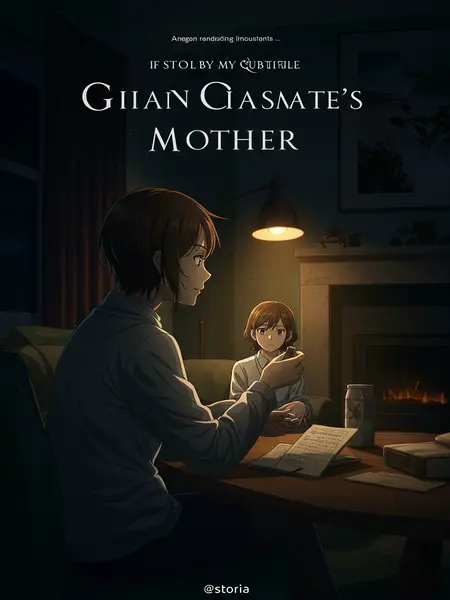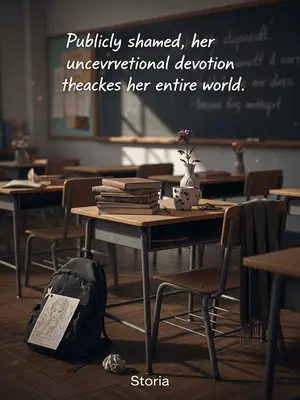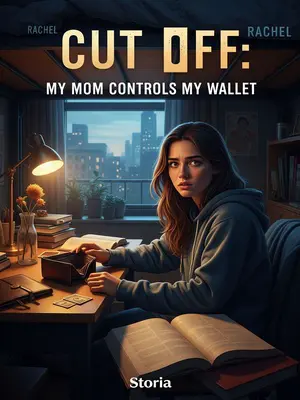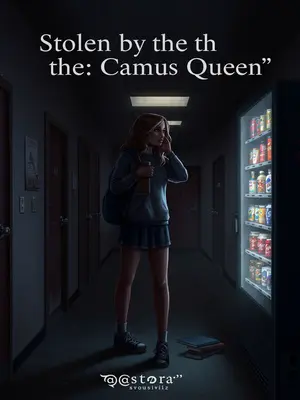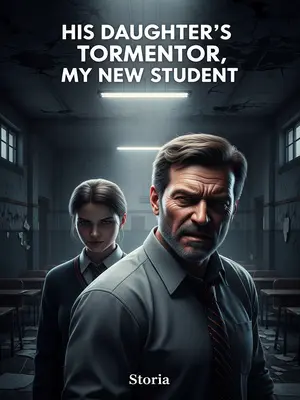Chapter 1: The Girl in Front of Me
Sometimes, late at night, the memory comes back so sharp I swear I can smell it: the school hallway flickering behind my eyelids, the echo of my sneakers on the linoleum, the sharp tang of bleach, and a cold crawling up my spine. I did something terrible when I was in middle school.
That memory sits heavy in my chest, like a stone I can’t cough up. Back then, I didn’t feel a thing—in fact, I felt lucky no one found out. But when the whole truth finally hit me, I was so desperate I wanted to disappear for good.
If there’s a hell, I’ve probably got my name on a seat.
1
Back in middle school, people thought I was a good kid. My grades weren’t top of the class, but I was steady and sensible. Compared to the other guys my age, I seemed more mature.
Teachers would grin and call me a real stand-up kid, and classmates saw me as the reliable one—helpful in group projects, someone who’d let you copy homework if you needed. I wore the role like a favorite hoodie; everyone just trusted me by default.
I was good at playing along, so I got along with everyone. To my classmates, I was trustworthy; to my teachers, well-mannered.
But it was all an act. Only I knew how much it cost to keep that mask on.
Underneath, I was nowhere near as calm as I looked. My personality was dark and stormy, full of negative thoughts. I started smoking and skipping class back in elementary school.
No one expects to see an eleven-year-old flicking a Marlboro behind the dumpsters or sneaking out the back fence, but I’d done both—more than once. My real self always seemed just under the surface, itching to break out.
By the time I got to middle school, I told myself I’d start fresh and worked hard to look like a good student.
But it all fell apart anyway.
It started in my second year of middle school.
That year, a girl named Natalie Reed transferred into our class. She sat at the desk right in front of me.
She was distant—never smiling, never talking, always wrapped up tight in herself.
She’d tuck her hands in her sleeves, keep her head down, and if you called her name, she didn’t even flinch. She never turned around. Sometimes, I imagined if she did, her face would be blank—no features at all. Years later, I’d wake up from nightmares just like that.
Honestly, I can’t picture Natalie’s face anymore. She must’ve had one of those plain, forgettable faces.
But I remember the little things.
Her hair was jet black, always tied neatly at the back, and her neck was thin and pale.
One time, I counted the tiny freckles on her nape—lined up perfectly above her collar. She always kept her head down, so that white patch of neck would show, with two sharp vertebrae that looked like they could snap.
Her collar was always perfectly ironed, never a drop of sweat; her shirt crisp, with only the faintest creases at the shoulder blades.
Even after gym, when the rest of us reeked of sweat and grass, she still smelled like lemon laundry detergent and something clean, almost like rain. Natalie’s shirt always looked fresh—like she’d just stepped out of a JCPenney catalog. I couldn’t help but stare.
During morning reading, sunlight would hit just right and the fine hairs on her neck would glow. Her clothes always carried that fresh, soapy scent.
If you closed your eyes, you could almost imagine standing in her laundry room, lemony powder in the air, everything warm and spotless. I’d peek over my book, zoning out while staring at her back.
Why did I keep watching her? I couldn’t say.
Maybe it was the mystery. Or maybe focusing on her just felt safer than looking at myself.
One day, I couldn’t hold it back. I tossed a pen at Natalie’s feet, tapped her shoulder, and asked her to pick it up. She bent down, handed it back, head still down, never meeting my eyes.
Her fingers were cold as ice. My own hand almost trembled, but I played it off, acting like it was nothing.
I found excuses to walk over to her desk—handing out homework, collecting it, whatever—just to see what she was doing. She was always fussing with her pencil case, obsessed with lining up her stuff.
One time, I watched her arrange her pencils by length, then color. It was hypnotic. I couldn’t help but wonder what her mind looked like inside.
The more I watched, the more curious I got. Sometimes I’d tap her shoulder, trying to start a conversation—
"What’d you have for dinner last night?"
"Do you know how to do this problem? I can teach you."
"Do you talk to your mom at home, or nah?"
But Natalie always turned around the same way—blank, head down, silent, cold as winter. I couldn’t even tell if she heard me.
It was like trying to talk to a ghost. Not angry, just somewhere far away. She was like that with everyone. In class, she kept her head down, barely listening, and her grades were always at the bottom.
At first, people tried to be friendly, but no one can take that kind of cold shoulder for long. Eventually, everyone gave up. Only I kept trying, but got nothing back.
Everyone knew Natalie had issues.
She had autism—a neurodevelopmental thing you can’t cure, only manage with early help to keep it from getting worse.
Most kids didn’t really get it, but word went around: "She’s autistic. That’s why she acts weird." The fact that she could keep her emotions in check, take care of herself, and sit in a regular class—that was already her family working overtime.
There was another reason, too. The school gave her extra care because her mom was our geography teacher.
My interest in Natalie was obvious. Some classmates whispered that I was trying to suck up to the teacher’s kid for grades, but then remembered geography was just an elective, so there wasn’t much point.
So, more people started saying I liked Natalie.
The rumor spread fast, the way they do in a suburban middle school. No one said it to my face, but behind my back, it was all "Dude, you got a crush on the weird girl or what?" I couldn’t even argue with them.
Natalie’s mom, Ms. Reed, was grateful that I’d talk to her daughter. She called me to her office, handed me snacks, and asked if I’d keep helping Natalie.
Ms. Reed was gentle and beautiful. When she smiled, her eyes curved up, making you feel warm inside—like spring had finally come. She was the total opposite of her cold, distant daughter.
She had this classic Midwest vibe—corduroy jackets in the fall, a Mason jar of wildflowers on her desk, and a voice so soothing you’d relax even if she was scolding you. Natalie’s dad had left years ago. He bailed not long after Natalie’s diagnosis. For more than ten years, Ms. Reed raised her daughter alone, poured all her savings into therapy, taught her life skills, corrected her behaviors, and never gave up.
A gentle spring breeze trying to thaw an iceberg—it was a long, impossible job. Natalie grew up, but stayed emotionally flat, slow to learn, never spoke, wouldn’t even call her "Mom"—not since two years ago.
Ms. Reed loved nature, so she majored in geography; she loved the world, so she became a teacher.
She loved everything and everyone. But her daughter loved nothing.
It’s hard to picture how these two relied on each other, or how Ms. Reed kept going through years of hopelessness.
The truth is, Ms. Reed didn’t need to greet me at all. I wouldn’t have been able to stay away from Natalie anyway.
Natalie just had this pull on me.
I knew it wasn’t a crush, but if I didn’t like her, why did I keep trying?
It confused me, too.
Natalie had a face so plain and cold it made people uneasy. Nobody would want her, except her mom.
She even scared me sometimes.
Countless times, in the middle of the night, remembering those school days, I’d break out in a cold sweat and wake up from nightmares.
Sometimes I’d sit up in bed, clutching my sheets, trying to shake off the feeling that she was still sitting in front of me, silent and unmoving.
